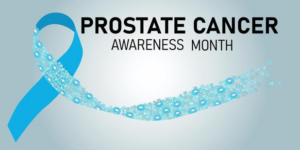
September marks prostate cancer awareness month, an important time to shine a spotlight on one of the most common cancers affecting men. Prostate cancer will impact 1 in 8 men during their lifetime, and while the risk increases with age, early detection and healthy lifestyle choices can make a major difference in outcomes.
Why awareness matters
Prostate cancer often develops slowly and may not cause symptoms in its early stages. That means many men will not know they have it until it is more advanced. Regular screening and open conversations with a healthcare provider are key to catching prostate cancer early, when treatment is most effective.
Who is at risk?
Several factors can raise a man’s risk of prostate cancer, including:
- Age–most cases occur in men over 50
- Family history–men with a father, brother or son diagnosed with prostate cancer are at higher risk
- Race–African-American men are more likely to develop prostate cancer and often at a younger age
- Lifestyle–diets high in red meat and low in fruits/vegetables may increase risk
Screening: What you should know
Screening usually involves:
- PSA blood test measuring PSA levels, which can be elevated and prostate cancer and other conditions
- Digital rectal exams are typically no longer recommended by experts for routine screening
Screening is not “1 size fits all.” The American Cancer Society recommends that men talk with their doctors about screening starting at:
- Age 50 for men at average risk
- Age 45 for men at high risk
- Age 40 for men at very high risk (multiple family members with prostate cancer before age 65)
Lifestyle and Prevention
While some risk factors cannot be changed, there are steps men can take to lower their overall risk:
- Eat a balanced diet rich in fruits, vegetables and whole grains.
- Limit processed and red meats.
- Stay active, aim for at least 150 minutes of exercise each week.
- Maintain a healthy weight.
- Do not smoke, and limit alcohol intake.
The Takeaway
Prostate cancer awareness month is a reminder for men and their loved ones to prioritize health. If you or someone you know is due for a conversation about prostate health, now is the time to schedule a checkup. Early detection saves lives. Schedule an appointment with your Summit provider today.
